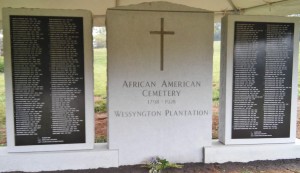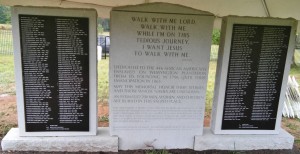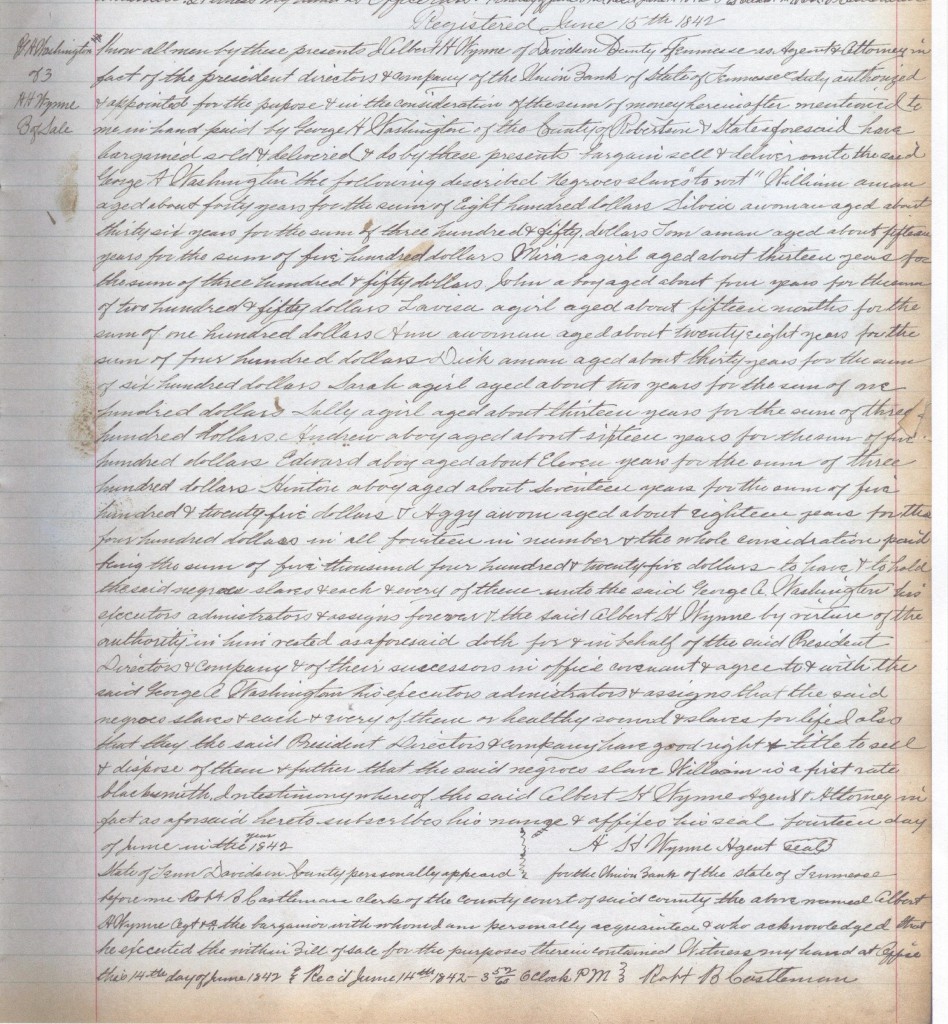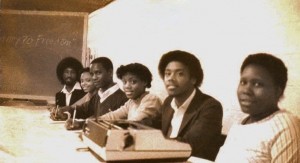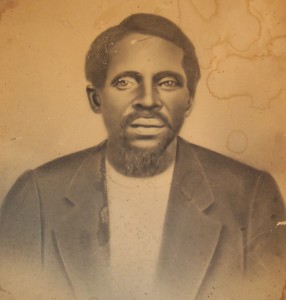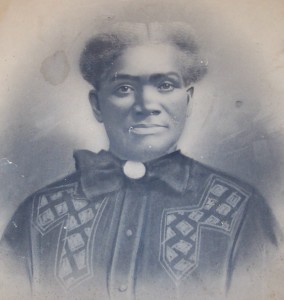Posts Tagged ‘Wessyngton Plantation’
DEDICATION OF WESSYNGTON MEMORIAL MONUMENT
Monday, October 5th, 2015Slave Bill of Sale Reveals History of 14 Slaves on Wessyngton Plantation
Saturday, June 14th, 2014Slave Bill of Sale from Union Bank of Tennessee to George A. Washington 1842
Among the thousands of documents in the Washington Family Papers housed in the Tennessee State Library and Archives are approximately 50 slave bills of sales. These sales involved 130 enslaved individuals purchased by Joseph Washington and his son George A. Washington from 1801 to 1843. The sales included several nuclear families: mothers and their small children; a family of five brothers; five men from the same plantation of unknown relationships; 29 slaves made up of 7 interrelated families; and one discussed here which includes fourteen slaves.
In June 1842, George A. Washington purchased 14 slaves from the Union Bank of Tennessee. Included in the transaction was William, described as a first-rate blacksmith. He was listed later on Wessyngton documents as Billy “the smith” and became Bill Smith after Emancipation. His wife Sylvia, their sons Tom and John and daughters Mira and Louisa were also listed.
Another family was Dick Scott, his wife Ann and their 2-year old daughter Sarah. Dick and Ann’s son, William Henry Scott, who was born at Wessyngton enlisted with the United States Colored Troops during the Civil War.
Also included in the purchase were Sally, Anderson, Edward, Henton and Aggy. It is not known if they were related; they could have been siblings. Aggy later married Dick Terry who was brought to Wessyngton Plantation 4 years earlier.
The descendants of those African Americans who were purchased in 1842 now number in the thousands.
Know all men by these presents that I Albert K. Wynne of Davidson County, Tennessee as agent and attorney in fact of the President, Directors & Company of the Union Bank of the State of Tennessee duly authorize and appointed for that purpose for and in consideration of the sums of money herein after mentioned to me in hand paid by George A. Washington of the county of Robertson & State aforesaid have bargained sold and delivered and do by these presents bargain sell and deliver unto the said George A. Washington the following described negro slaves to wit: William a man aged about forty years for the sum of eight hundred dollars; Sylvia a woman aged about thirty-six years for the sum of three hundred & fifty dollars; Tom a man aged about fifteen years for the sum of five hundred dollars; Mira a girl aged about thirteen years for the sum of three hundred & fifty dollars; John a boy aged about four years for the sum of two hundred dollars; Louisa a girl aged about fifteen months for the sum of one hundred dollars; Ann a woman aged about twenty-eight years for the sum of four hundred dollars; Dick a man aged about thirty years for the sum of six hundred dollars; Sarah a girl aged about two years for the sum of one hundred dollars; Sally a girl aged about thirteen years for the sum of three hundred dollars; Anderson a boy aged about sixteen years for the sum of five hundred dollars; Edward a boy aged about eleven years for the sum of three hundred dollars; Henton a boy aged about seventeen years for the sum of five hundred and twenty-five dollars; and Aggy a woman aged about eighteen years for the sum of four hundred dollars; being in all fourteen in number and the whole consideration paid being the sum of five thousand four hundred and twenty-five dollars. To have and to hold the said negro slaves and each and every of them unto the said George A. Washington his executors administrators and assigns forever. And the said Albert H. Wynne by virtue of the authority in him vested as aforesaid doth for and on behalf of the said President, Directors & Company and of their successors in office covenant and agree to and with the said George A. Washington his executors administrators and assigns that the said negro slaves and each and every of them are healthy, sound and slaves for life and also that they the said President, Directors & Company have good right and title to sell and dispose of them and further that the said negro slave William is a first-rate blacksmith.
In testimony whereof the said Albert H. Wynn, agent and attorney
Gardner Family to Celebrate 77th Annual Family Reunion
Tuesday, July 26th, 2011On August 20th through 21st the Gardner family will celebrate their 77th annual family reunion in Springfield, Tennessee. The Gardners have held a reunion on the same date each year since 1935. The Gardner family is one of the largest African American families in Robertson County, Tennessee. I am currently working on a family tree for the reunion which includes nearly 800 direct descendants from Aaron and Betty Gardner. Aaron and Betty along with their three sons, Daniel, George and Jackson were enslaved on the Wessyngton Plantation from 1839 to 1865. The reunion will include a tour of the Wessyngton Plantation.
30 Year Old Photo Foretells Subtitle of The Washingtons of Wessyngton Plantation
Tuesday, July 26th, 2011Recently while going through some old photographs, I ran across this one taken with childhood friends Wanda Gardner, Drextel Bowling, Teresa Gardner, Charles Gardner and Kim Bradley. The photo was taken in 1981 at Greater South Baptist Church during a Black history lesson. I was quite surprised when I noticed the blackboard behind me had part of the subtitle to my book Journey to Freedom in the background nearly thirty years before the book was published. My publishers at Atria Books, a Division of Simon & Schuster selected the subtitle for The Washingtons of Wessyngton Plantation.
Portraits of Gardner Ancestors Revealed at 76th Gardner Family Reunion
Monday, April 11th, 2011
In August 2010 the Gardner family celebrated their 76th annual family reunion. The festivities included a tour of Wessyngton Plantation. Aaron Gardner born 1804, his wife Betty born 1814, and their three sons Daniel Gardner 1829-1911, George Gardner 1830-1906, and Jackson Gardner Washington born 1831 were enslaved on the plantation from 1839 to 1865. After emancipation George Gardner purchased 169 acres of land, which he willed to his nephew Will Gardner. Daniel Gardner and his wife Melissa Boisseau Gardner were the parents of eighteen children. Many of their descendants remain in the Robertson County area. There are more African Americans carrying the Gardner surname than any other surname in the county. Two original portraits of Daniel and Melissa Gardner were revealed to descendants at the 76th Gardner family reunion.
Runaway Slave Escapes to Freedom in Canada
Wednesday, January 19th, 2011Elijah Smyth or Smith was originally owned by Joseph L. D. Smith on his plantation in Florence, Alabama. When Joseph Smith died in 1837, Elijah was inherited by Smith’s minor daughter Jane, who later married George Augustine Washington of Wessyngton Plantation.
Between 1850 and 1860, Elijah Smyth made his escape from slavery in Alabama most likely using the Underground Railroad. He made it to freedom in Buxton, Canada. Buxton, was established in 1849 by the abolitionist Reverend William King, and was one of four settlements in Canada which offered refuge for fugitive slaves. Buxton was located between Lake Erie and the Great Western railway, and consisted of approximately 9,000 acres of land. The logging industry provided an income for most of its residents.
Reverend King had strict guidelines for the settlers: land could not be leased, and could only be purchased by African Americans for $2.50 per acres. Once the land was purchased it had to be held for ten years. Houses had to be built that were at least 24 x 18 x 12 feet with a porch, and picket fence and flower garden in front. The town had four churches, three schools, a hotel and its own post office. In 1860, Buxton’s population was its largest with about 700 residents.
Elijah Smyth was literate. Since educating slaves was forbidden by law in Alabama, he probably was educated at the Buxton school.
Between 1850 and 1860, Elijah Smyth wrote a letter to Jane Smith’s aunt, Anne Pope. He sent the letter from Buxton, Canada.
Mrs. Pope,
Will you be so kind as I do not know who my young Mrs. is married to or where she lives. The least she will take for my papers of liberty as I am ready to pay a reasonable price. It is better for her to get a half loaf than no bread. If she will take a reasonable price write to me and then I will write to you and let you know what day to have a man in Detroit with my papers and will send the money by a friend to meet him. Be so kind as to write to me in haste.
No more but kindness,
Yours truly Elijah Smyth
[Washington Family Papers]
In the letter Elijah Smyth offered to purchase his freedom. It is unknown why he made the offer since he was already free. He might have wanted to purchase the freedom of other family members who were still enslaved. It also is not known whether Jane Smith responded to his letter or accepted his offer.
Author Shows History Begins at Home
Thursday, March 4th, 2010The Washingtons of Wessyngton Plantation reviewed in Nashville City Paper by Todd Dills. Click here to see review.
